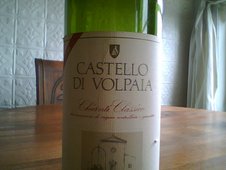
Because it's all-kosher, you putz! Because they have pitchers and a basin at the entrance so you can ritually wash your hands, if you wish. Because the servers must wash out your glass between each taste in order to keep with the laws of kashrut. Because there is tons of food. (What? You're going to invite guests over and not feed them?)
Other than that, and a lot of black hats and beards, it was very much like any other wine tasting: A great deal of dross and some wonderful juice, if you knew where to look. I knew where to look, having gone to last year's Kosher Food & Wine Experience (as it is called). I headed directly over to what were called the "French Wine" tables, and sampled the new vintage of the $500-a-pop Chateau Valandraud, Jean-Luc Thunevin's praised garagist Bordeaux. This was a revelation when I tasted it last year. Frankly, the new 2002 vintage was a disappointment: tight and sour. I'm sure it will mature, but it was no delight at present. A real delight, however, was the news that Thunevin's second label, Virginie de Valandraud, which is much less expensive, is now being made in a kosher version.
Soon after, I headed for the Spanish table, which can only mean the wondrous Capcanes. I believe Capcanes Peraj Ha'abib, a blend of Garnacha, Cabernet Sauvignon, and Carignan, may possibly be the finest kosher wine on the planet. It is deep and juicy and dignified and beautifully structured, with well-integrated tannins. A great wine by any measure. They also had on hand their new entry level kosher, Peraj Petita, which was like an immature version of the Perag. I don't mean that in a negative way. It was simply not as profound, but just as wonderful in its way, and eminently drinkable. The grapes used here are Garnacha, Samso and Ull de Llebre.
The tasting also gave me the chance to try the vaunted Castel brand of Israel. The table was serving up all three labels—Castel Grand Vin, Petit Castel, and Castel "C" Blanc—and there wasn't a loser in the bunch. All three were modeled after the Bordeaux model, and didn't far miss their mark. I returned to some past favorites—the Cab-Merlot blends of Bazelet Hagolan and Psagot—and was impressed once more with how far along the Israel wine industry has come from just a few years ago. New discoveries were the Binyamina Chardonnay Special Reserve and Onyx, another Chardonnay. Both were complex, the former left on the lees for some time and rendered pungent, rich and forceful in the manner of some Friuli whites (I thought), the latter tapped from a single vineyard and showing plenty of tasteful discipline.
Those were the best. Of the rest, something has to be done with the Italian kosher wine industry. Bartenura and Rashi just ain't doing the job. Insipid stuff. As for the Australians—well, they're Australians and not my cup of flabby, fruity tea. The folks at the Covenant table were certainly impressed with their boutique Napa Cab, which has been raking in the review in the last couple years. It was good, no doubt, but didn't knock me over. They kept going on about how the land naturally imparted very soft tannins. Soft they were. Too soft, perhaps. It made an already very fruit-forward wine all the more fawningly friendly. It was a California wine, simply said. And just the sort of thing Robert Parker would like; and he has. They can keep it at $75. I'll stick with the more complex Israeli and Spanish wines mentioned above.


No comments:
Post a Comment